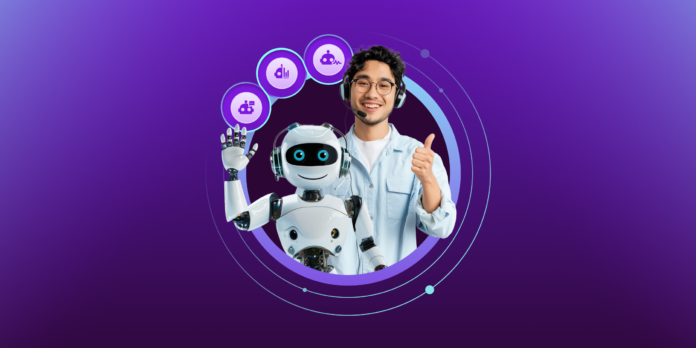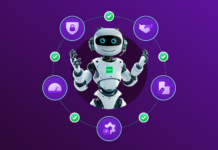While at the National Association of Mutual Insurance Companies (NAMIC) Annual Convention, I attended a session on practical use cases for AI within insurance. The panel opened with an alarming data point—despite the insurance industry ranking near the top in researching generative AI uses, it sits at the bottom of AI uses in production.
Insurance leaders see the potential of AI, yet few companies are diving into the deep end. Now, insurance is an inherently risk averse industry when it comes to this new technology. Insurance companies are understandably wary of deploying AI, particularly around areas of serious compliance risks like underwriting and claims adjudication.
However, insurance companies who fail to begin realizing the power and benefits of AI will quickly fall behind competitors who do.
One area of the business the panel agreed is ripe for AI use today within insurance is customer service. In this blog, I’ll cover three customer service uses for AI within insurance, and share a bit about how Glia is helping insurance companies drive real value from AI.
Insurance Chatbots and Virtual Assistants
Customer-facing AI, like chatbots and virtual assistants, are what most people think of when they think about customer service AI. This is for a good reason—leveraging AI to automate routine service interactions and deflect call volume can be a huge efficiency gain.
When considering customer AI use cases within your organization, look for opportunities where your team is handling high, repetitive volume. A great example of this is customers frequently calling in to find out the status of their claim. Deploying a chatbot that can provide those status updates and free your team up to handle the more complex claims conversations can be a win-win.
This area of AI, though, also poses the greatest risk and compliance concerns of the three use cases we’ll cover. When deploying customer-facing AI, it’s important to find a partner who can help you safely and responsibly introduce AI into your business.
AI Assistant for Customer Service Representatives
Frontline teams servicing policyholders and agents face mounting challenges. With interaction volumes climbing and staff retention becoming increasingly difficult, these teams are under immense pressure to maintain service quality while handling more requests. This is where AI features can make a significant difference.
Automating portions of customer service rep (CSR) workflows with AI is a great way to drive efficiencies for your customer service operations, all while keeping human oversight over the AI to mitigate risk concerns.
Some examples of AI assisting frontline teams could be suggesting responses based on the customer’s question, or automatically summarizing an interaction when transferred to the next representative.
The natural language processing capabilities of AI—for phone or digital interactions—can also save CSRs valuable time by instantly writing full, summarized wrap ups at the end of interactions. This ensures all calls are well-documented and standardizes data capture for improved reporting for the business.
Plus, these AI features not only boost productivity but also enhance the customer experience by reducing wait times and improving response accuracy. Ultimately, AI empowers frontline teams to focus on high-value interactions where the human touch is irreplaceable, striking the perfect balance between efficiency and personalized service.
Glia has built out a robust set of AI features designed to help frontline teams be more efficient. You can learn more about these capabilities in this short video.
AI Insights for Managers
Contact center managers often struggle with time-consuming data analysis and limited insights from static reports. Traditional methods require managers to sift through vast amounts of information, making it difficult to identify trends, assess CSR performance, and improve customer experiences efficiently.
Enter, AI for managers: Cutting-edge AI solutions can enable managers to interact with their data using natural language queries, eliminating the need for complex report navigation. By simply asking questions, managers can quickly uncover valuable insights about customer and agent interactions, identify areas for improvement, and ultimately make more informed data-driven decisions.
Leveraging AI in this manner not only saves time but also provides deeper, more actionable insights. With these advanced tools at their fingertips, managers can unlock the full potential of their interaction data, leading to improved operations and customer experiences.
Not sure how to get started? Glia has developed these features within our platform for managers. Check it out in this short Manager AI video.





